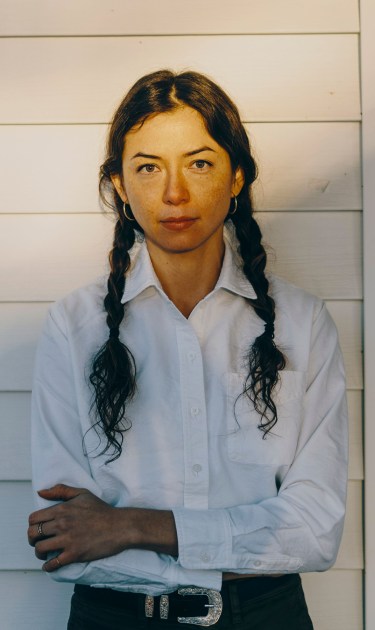“It was almost like a joke when I wrote it,” singer, songwriter, and multi-instrumentalist Renata Zeiguer tells Remezcla about the inspiration behind the title track of her new album. “I was telling my bandmates about this idea I had to describe the feeling of depression.” The origin of the evocative title Picnic In The Dark is appropriate since it encompasses so much of what makes Zeiguer’s music perfectly: steeped in darkness yet comical, as well as casual and important at the same time.
In many ways, music is in her blood. Though she grew up in the Riverdale side of the Bronx in New York to parents originally from Argentina and the Philippines, she would visit the former country twice a year during her childhood, which had a significant impact in her musical development. “My grandmother played the piano and she would play tango and ragtime, and my cousins liked bossa nova,” she says about her childhood visits to Buenos Aires. “It made a big impression on me because [the music] is so beautiful and romantic, and it can be kind of dark and playful.”
Those aspects are prevalent in the music Zeiguer makes. Picnic In The Dark was written after a period in which she wasn’t writing a lot of music for her solo project. But after composing a few songs, Zeiguer realized that a common thread was her childhood and inner child. The writing period of the album began after starting therapy for the first time. Writing music was a way to process things psychologically in a more creative way. “It allows me to understand and be playful with things that would otherwise be very serious and maybe heavy-handed,” she says.
Working with co-producer Sam Griffin Owens of the project Sam Evian, the music came quicker than the lyrics and was sparked by a deliberate decision on her part. “I wanted to record music without a band. I wanted to do it myself on my own terms, playing as many instruments as I felt I wanted to,” she says, adding that she also wanted to have a softer sound than on the last record, focusing more on her voice.

Around the time of Zeiguer’s debut full-length — 2018’s Old Ghost — she likened her songs to stories she would pen and set to music. Zeiguer thinks this has continued to be her M.O, even if her source of inspiration is more personal. “It’s like a spiral, a different cycle of the same thread. And I’m just an older version of myself, so I can process things in different ways,” she says. Both of her albums, have a sense of autobiographical inspiration, drawing from her psychology and feelings. “But I don’t normally like to be the actual center point of that,” she explains. “That’s why I’ve always liked to tell stories.”
“I think thematically, it’s a very similar subject with maybe a different outcome,” she continues. “There’s more positivity and resolution on this album. More maturity. I think we can all relate to the themes of the songs. The things that I process as an individual, I think are universal. We all have parents and childhoods, and we’ll grow out of our childhoods, and we all look back on things. So it’s personal, but it’s also just themes of being human. But I don’t think I wrote any of the songs with that in mind. It was all coming from a personal place.”
“The things that I process as an individual, I think are universal. We all have parents & childhoods, & we’ll grow out of our childhoods, & we all look back on things. So it’s personal, but it’s also just themes of being human.”
As noted, Picnic In The Dark possesses a playful quality that connects fantasy imagery with adult issues. To Zeiguer, this is an important creative resource. “Maybe from a young age, I realized within my family that humor is the only thing that can break a silence or depression or anger,” she says. “It’s very powerful to be playful and to make someone laugh and to not take things so seriously. I’ve always liked themes that are playful but also very adult, like a lot of fairytales or Willy Wonka and the Chocolate Factory or The Wizard of Oz. It’s okay to be playful and childish, and in a way, it can be very mature for an adult to be this way.”

A song that ties up the themes found on Picnic In The Dark is its closing track, “Primavera.” The only track sung entirely in Spanish, “Primavera” proved to be challenging yet an important addition to the album. It was also a nice way to point to Zeiguer’s future. “It’s a direct reference to that part of my life [her family trips to Argentina]. I thought it would be fun to sing in Spanish because it feels more freeing and more beautiful than in English. And I wanted to do something on the acoustic guitar. To me, it felt like a resolution, like a closing number, because it was like it’s gone through a whole cycle of the season,” she explains.
“So that’s why it’s Spring. Because after winter, your death comes rebirth. It felt appropriate that that was like the ending point of this album, with optimism, love, and softness. I wanted to really bring that into this record because that’s where I am in my life.”
Listen to Picnic In The Dark below.





